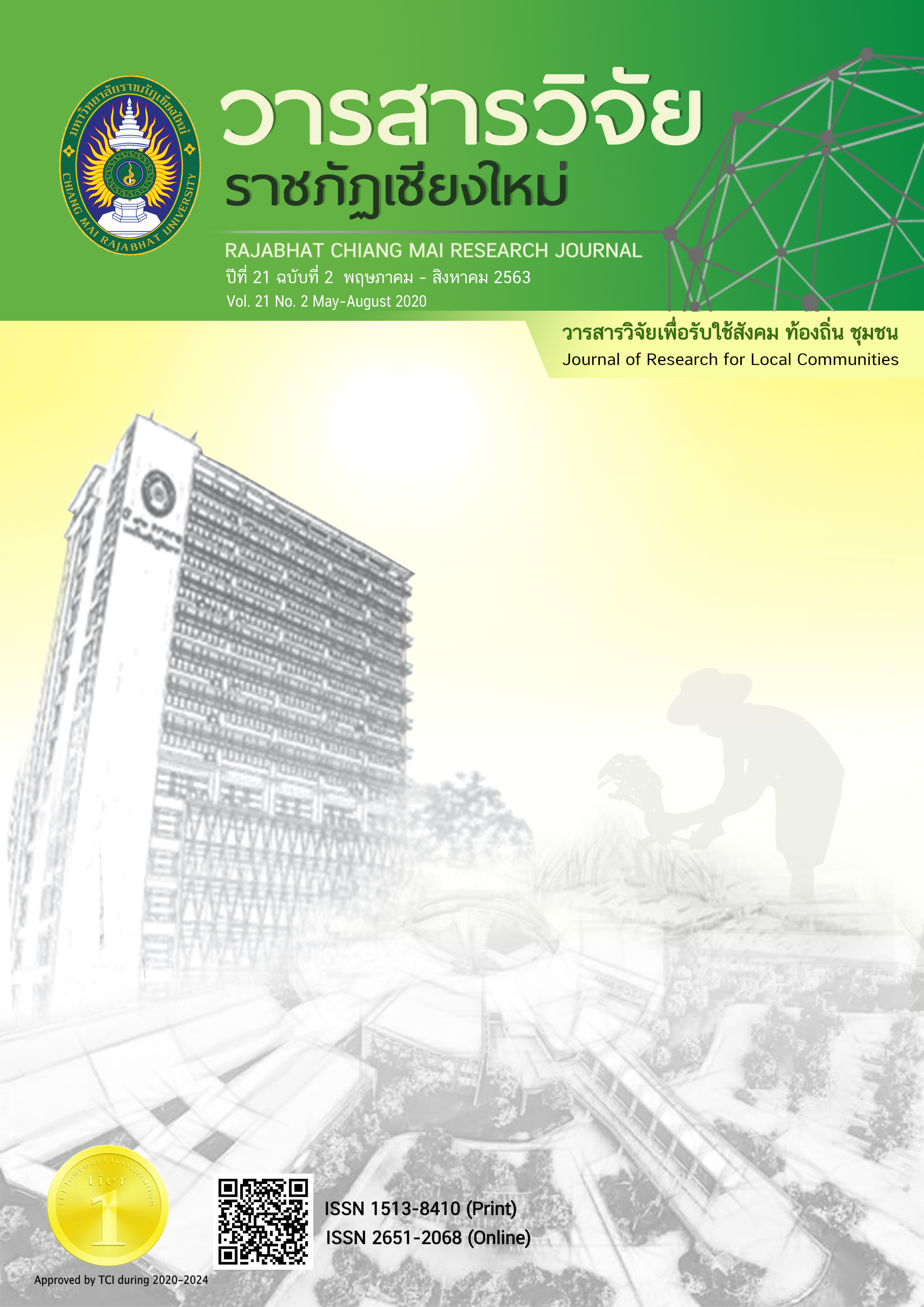บทบาทขององค์การบริหารส่วนตำบลต่อการบริหารจัดการขยะชุมชนสู่ความสำเร็จอย่างยั่งยืน กรณีศึกษา องค์การบริหารส่วนตำบลคูเมือง อำเภอหนองบัวแดง จังหวัดชัยภูมิ
DOI:
https://doi.org/10.14456/rcmrj.2020.238054คำสำคัญ:
บทบาทขององค์การบริหารส่วนตำบล, การบริหารจัดการขยะชุมชน, ความสำเร็จอย่างยั่งยืนบทคัดย่อ
งานวิจัยนี้มีวัตถุประสงค์เพื่อศึกษาบทบาทขององค์การบริหารส่วนตำบลคูเมืองที่นำไปสู่ความสำเร็จในการจัดการขยะของชุมชนอย่างยั่งยืน เป็นการวิจัยเชิงคุณภาพโดยใช้การสนทนากลุ่มย่อย การสังเกตแบบมีส่วนร่วม และการวิเคราะห์ข้อมูลเอกสารทางการเงิน โดยทำการวิเคราะห์ข้อมูลเชิงเนื้อหา
ผลการศึกษาพบว่า บทบาทขององค์การบริหารส่วนตำบลคูเมืองที่นำไปสู่ความสำเร็จอย่างยั่งยืนในการจัดการขยะของชุมชนประกอบด้วย 5 ด้าน คือ 1) ด้านการบริหารทรัพยากรมนุษย์ องค์การบริหารส่วนตำบลคูเมืองมีบทบาทในการเป็นผู้นำและริเริ่มโครงการจัดการขยะให้แก่ชุมชน 2) ด้านการบริหารงบประมาณ มีการจัดสรรงบประมาณที่จำเป็นต่อโครงการอย่างเพียงพอและเหมาะสม มีการจัดตั้งธนาคารขยะเพื่อส่งเสริมกิจกรรมคัดแยกขยะและสร้างรายได้เสริมในครัวเรือน 3) ด้านการบริหารงานทั่วไป มีการวางแผนจัดประชุม และจัดอบรมให้ความรู้แก่ประชาชน ตลอดจนส่งเสริมการมีส่วนร่วมในการจัดการขยะชุมชนของทุกภาคส่วน 4) ด้านการบริหารวัสดุอุปกรณ์ มีการจัดสรรวัสดุอุปกรณ์ที่จำเป็นในการเริ่มต้นและดำเนินโครงการ อาทิเช่น ถังขยะสำหรับแยกขยะ เครื่องมือในการแปรรูปขยะเป็นปุ๋ยหมัก เตาเผาขยะ เป็นต้น และ 5) ด้านการบริหารคุณธรรม มีการจัดทำบัญชีรายรับรายจ่ายที่ประชาชนสามารถตรวจสอบความโปร่งใสได้ และมีการรายงานผลโครงการในที่ประชุมประจำเดือน ข้อเสนอแนะของการวิจัย ในการนำรูปแบบการบริหารจัดขยะขององค์การบริหารส่วนตำบลคูเมืองไปใช้ จะต้องมีการปรับปรุงหรือประยุกต์รูปแบบให้เหมาะสมกับบริบทของพื้นที่ที่จะนำไปใช้ก่อน เนื่องจากแต่ละพื้นที่มีความแตกต่างกันทั้งสภาพแวดล้อม ทัศนคติ และความเชื่อของประชาชนแต่ละพื้นที่
Downloads
เอกสารอ้างอิง
Buranasingh, N. (2017). The Civil State Policy: Guidelines for Waste Management in Thailand. Bangkok: The Secretariat of the House of Representatives. (In Thai)
Hongthong, R., & Udomsub, T. (2016). Visionary Leadership in Leading Change Context. Journal of Humanities, Faculty of Humanities and Social Sciences Phetchaburi Rajabhat University, 18(2), 73-87. (In Thai)
Khu Mueang Subdistrict Administration Organization. (2019). Supporting Documents for Waste Management Information Presentation.Chaiyaphum: Division of Education, Khu Mueang Subdistrict Administration Organization. (In Thai)
Longnam, C. (2019). Guidelines for Waste Management. Chiayaphum Province. Interview. (In Thai)
Sammapetch, S. (2016). Fundamentals of Administration in the Bureaucracy. Bangkok: Krirk University. (In Thai)
Satidworahirun, K. (2014). Solid Waste Management System for Thapho Sub-District Administrative Organization, Muang, Phitsanulok. Sequel Report Academic Conference and Present National and International Research at Kamphaeng Phet Rajabhat University. P.225-231. Kam Phaeng Phet: Kamphaeng Phet Rajabhat University. (In Thai)
Srivichai, M., Chaidaen, P. Teerapong, W., & Jaturon, K. (2014). Waste Management in the Muang-Pan Community Pan District, Chiang Rai Province. Journal of Community Development and Life Quality, 2(3), 245-254. (In Thai)
The Ministry of Natural Resources and Environment. (2017). National Solid Waste Management Master Plan (2016-2021). Bangkok: Reginal Environment Office. (In Thai)
The Waste and Hazardous Substances Management Bureau. (2017). Thailand State of Pollution Report 2016. Bangkok: Pollution Control Department. (In Thai)
Tussanapaiboon, W. (2017). Strategy Development for Waste Management of Local Government in Kamphaeng Phet. Journal of Graduate Studies in Northern Rajabhat Universities, 7(13), 67-82. (In Thai)
Woracchitsanupong, W. (2017). Community Solid Waste Management Model in Dongmada Sub, District, Mae Lao District, Chiang Rai Province. Report from the International Academic Conference, Naresuan Research Conference 13, P,1262-1271. Phitsanulok: Naresuan University. (In Thai)
ดาวน์โหลด
เผยแพร่แล้ว
รูปแบบการอ้างอิง
ฉบับ
ประเภทบทความ
สัญญาอนุญาต
1. บทความ ข้อมูล เนื้อหา รูปภาพ ฯลฯ ที่ได้รับการตีพิมพ์ใน “Community and Social Development Journal” ถือเป็นลิขสิทธิ์ของ Community and Social Development Journal มหาวิทยาลัยราชภัฏเชียงใหม่ และเพื่อให้เผยแพร่บทความได้อย่างเหมาะสมผ่านสื่อสิ่งพิมพ์และอิเล็กทรอนิกส์ ผู้เขียนยังคงถือครองลิขสิทธิ์บทความที่ตีพิมพ์ภายใต้ใบอนุญาต Creative Commons Attribution (CC BY) ซึ่งอนุญาตให้เผยแพร่บทความซ้ำในแหล่งอื่นได้ โดยอ้างอิงต้องอ้งอิงบทความในวารสาร ผู้เขียนต้องรับผิดชอบในการขออนุญาตผลิตซ้ำเนื้อหาที่มีลิขสิทธิ์จากแหล่งอื่น
2. เนื้อหาบทความที่ปรากฏในวารสารเป็นความรับผิดชอบของผู้เขียนบทความโดยตรง ซึ่งกองบรรณาธิการวารสารไม่จำเป็นต้องเห็นด้วยหรือร่วมรับผิดชอบใดๆ














